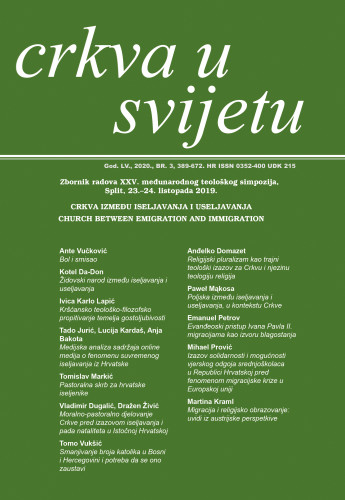U ovom članku autor analizira osobitu vezu koja postoji između židovskog naroda i Svete zemlje. Židovski narod preživio je brojna iseljavanja i useljavanja u svojem trajnom hodočašću prema „Obećanoj zemlji”. Ta hodočašća uspjela su izgraditi, oblikovati i održati židovski nacionalni identitet u najtežim trenutcima dugotrajnog egzila. Prvi dio članka sastoji se od općenitog uvoda, nakon kojeg slijedi glavni prikaz iseljavanja i useljavanja u povijesti židovskog naroda. U središnjem dijelu članka raspravljat će se o dvjema glavnim temama. Prva je teološko značenje iseljavanja i useljavanja Židova kao znak božanske providnosti te primjena ideja nagrade i kazne kojima se izražava ispunjenje proroštava iznesenih u Tori i knjigama židovskih proroka (težak izgon, uništenje Obećane zemlje te njezino opustošenje tijekom vremena egzila, ali i povratak izraelskog naroda u nju). Druga tema je ljubav i čežnja židovskog naroda za Cionom, gdje će autor pokazati kako su Biblija i duhovni vođe, rabini, pomogli olakšati bol naroda zbog izgona uvođenjem raznovrsnih blagdana, običaja i molitava kojima su osnažili kolektivno nacionalno pamćenje te održali nadu u okupljanje izgnanih, izgradnju Jeruzalema i Hrama te u dolazak Mesije. Posljednji dio članka obrađuje krize s kojima se židovski narod suočavao tijekom dugog i teškog puta do Ciona. Autor se u radu uz biblijske izvore služi i vrelima iz rabinske literature, od talmudskih vremena preko srednjega vijeka sve do modernog doba. Velik dio literature prvi je put na hrvatski s hebrejskoga i aramejskoga preveo upravo autor.; In this article the author analyses the special bond between the Jewish people and the Holy Land. The Jewish people emigrated numerous times during their permanent pilgrimage towards the “Promised Land”. These pilgrimages helped to build, form and maintain the Jewish national identity during the most difficult moments of the long Exile. The first part of the article consists of a general introduction, followed by the main descriptions of immigration and emigration in the history of the Jewish people. The central part of this article deals with two main issues: the first one is the Jewish theological importance of immigration and emigration of the Jews as a sign of Divine providence and the implementation of the idea of reward and punishment that expresses the fulfilment of the prophecies written in the Torah and the books of the Jewish Prophets about the harsh Exile, the destruction of the Promised Land and its barrenness during the time of the Exile, as well as the return of the people of Israel to the Promised Land. The second issue is the love and longing for Zion in the Jewish national collective, where the author shows how the Bible and the spiritual leaders, the Rabbis, helped the nation relieve the pain of the Exile by establishing different holidays, customs and prayers to strengthen the collective national memory and keep going the hope for the ingathering of the Exiles, the building of Jerusalem and the Temple and the coming of the Messiah. The last part of this article explores some of the crises, which the Jewish people faced on their long and hard way to Zion. In this paper, the author uses many sources from the rabbinical literature since Talmudic times through the middle Ages until modern times. Much of this literature is translated into Croatian from Hebrew and Aramaic for the first time by the author.
Sažetak

 Crkva u svijetu : 55,3(2020) / glavni i odgovorni urednik, editor-in-chief Mladen Parlov.
Crkva u svijetu : 55,3(2020) / glavni i odgovorni urednik, editor-in-chief Mladen Parlov.